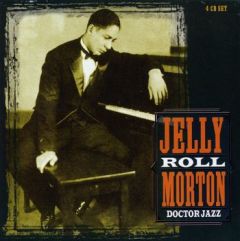Jelly Roll Morton - Doctor Jazz CD 4 (Blue Blood Blues) [1994]
Jelly Roll Morton - Doctor Jazz CD 4 (Blue Blood Blues) [1994]

01. My Little Dixie Home 02. That’s Like It Ought To Be 03. Each Day 04. If Someone Would Only Love Me 05. That’ll Never Do 06. I’m Looking For A Little Bluebird 07. Little Lawrence 08. Harmony Blues 09. Fussy Mabel 10. Pontchartrain Blues 11. Oil Well 12. Load Of Coal 13. Crazy Chords 14. Primrose Stomp 15. Low Gravy 16. Strokin’ Away 17. Blue Blood Blues 18. Musmouth Shuffle 19. Gambling Jack 20. Fickle Fay Creep (Soap Suds) 21. Winin’ Boy Blues 22. Ballin’ The Jack 23. Don’t You Leave Me Here 24. Mamie’s Blues 25. Michigan Water Blues Jelly Roll Morton - Composer, Piano, Spoken Word, Vocals Jelly Roll Morton's Jazz Band Jelly Roll Morton's New Orleans Jazzmen Jelly Roll Morton's Red Hot Peppers Jelly Roll Morton's Steamboat Four Jelly Roll Morton's Stomp Kings or Jazz Kids Jelly Roll Morton Trio New Orleans Rhythm Kings Bernard Addison - Guitar Barney Alexander - Banjo Henry "Red" Allen - Trumpet Ed Anderson - Trumpet George Baquet - Clarinet Paul Barbarin - Drums Bill Beason - Drums Sidney Bechet - Sax (Soprano) Bill Benford - Brass Band, Tuba Tommy Benford - Drums Barney Bigard - Clarinet Pete Biggs - Tuba Lee Blair - Banjo, Guitar Jerry Blake - Clarinet, Clarinet (Bass) Wellman Braud - Bass George Brunies - Trombone Ernie Bullock - Clarinet, Clarinet (Bass) W.E. Burton - Drums, Kazoo Happy Caldwell -Sax (Tenor) William Cato - Trombone Cozy Cole - Drums Sidney DeParis - Trumpet Wilbur De Paris - Trombone Baby Dodds - Drums Johnny Dodds - Clarinet Natty Dominique - Cornet Horace Eubanks - Clarinet Geechie Fields - Trombone Pops Foster - Bass Joe Garland - Sax (Tenor) Arville Harris - Sax (Alto) J.C. Higginbotham - Trombone Andrew Hilaire - Drums Howard Hill - Glockenspiel Charlie Holmes - Clarinet, Sax (Alto) Darnell Howard - Clarinet, Violin Charlie Irvis - Trumpet Manzie Johnson - Drums Claude Jones - Sax (Soprano), Trombone King Oliver - Cornet William Laws - Drums Lew LeMar - Effects John Lindsay - Bass Lawrence Lucie - Guitar Paul Mares - Cornet Chink Martin - Tuba Bubber Miley - Trumpet Bass Moore - Bass, Brass Albert Nicholas - Clarinet Kid Ory - Trombone Jack Pettis - Sax (C-Melody) Ward Pinkett - Trumpet Ben Pollack - Drums Russell Procope - Clarinet, Sax (Alto) Gerald Reeves - Trombone Zue Robertson - Trombone Fred "Rodriguez" Robinson - Trombone Rod Rodriguez - Piano Leon Roppolo - Clarinet Boyd "Red" Rossiter - Trumpet Eddie Scarpa - Clarinet Bud Scott - Guitar Glen Scoville - Sax (Alto), Sax (Tenor) Boyd Senter - Banjo, Clarinet, Composer, Kazoo, Sax (Alto) Omer Simeon- Clarinet, Clarinet (Bass), Drums Zutty Singleton - Drums Johnny St. Cyr - Banjo, Guitar, Spoken Word Edwin Swayzee- Trumpet Jasper Taylor - Wood Block Joe "Cornbread" Thomas - Clarinet, Sax (Alto), Sax (Tenor) Walter Thomas - Clarinet, Sax (Baritone), Sax (Tenor) Lorenzo Tio, Jr. - Clarinet Wilson Townes - Clarinet Quinn Wilson – Tuba
Born Ferdinand Joseph Lamothe in New Orleans (his year of birth is recorded variously as 1885 and 1890), he was the son of racially mixed Creole parents; he later took his stepfather’s last name, Morton, as his own. Young Ferdinand learned to play the piano as a boy, and by the age of 12 he was performing in the bordellos of Storyville, New Orleans’ famous red-light district. Talented and precocious, Morton blended the popular music styles of ragtime, minstrelsy and the blues and flavored the mixture with Caribbean dance rhythms; the result was a hybrid that resembled a then-emerging style later known as “jazz.”
Morton left home and went on the road at 17, traveling to cities around the country to perform his music; he also earned money as a vaudeville comic, gambler, pimp, pool shark and door-to-door salesman. He was keenly aware of his own talent and never hesitated to promote himself, insisting on being called by his nickname, Jelly Roll (which had sexual connotations), and claiming to have “invented” jazz. Such claims were false, but he was in fact the first great jazz musician to write his music down.
Morton lived for a time in Los Angeles and Chicago, and around 1923 began making his first recordings. He performed with a sextet (on such numbers as “Big Foot Ham” and “Muddy Water Blues”) and won acclaim for a series of piano solos of his own compositions. Around 1926, Morton began recording and performing with his seven- or eight-piece band, the Red Hot Peppers. Morton’s arranging and performing style was more formal than early Dixieland jazz; the performances were a mixture of composition and improvisation, and were carefully rehearsed. As a composer, some of his best-known works were “Black Bottom Stomp,” “King Porter Stomp,” “Shoe Shiner’s Drag” and “Dead Man Blues,” which became jazz standards.
Morton’s career declined in the early 1930s, and emerging artists such as Louis Armstrong exceeded him in popularity and influence. He moved from New York to Washington, D.C., where he managed a jazz club and occasionally performed. In 1938, Morton gave a series of oral interviews in which he recalled the early days of jazz in New Orleans and revealed himself to be an astute historian of the genre. The interviews sparked renewed interest in Morton; he recorded again briefly in 1939-40 but was by then in failing health (which he blamed on a voodoo curse). Morton died before the great Dixieland revival; his eventful life later became the subject of the acclaimed musical “Jelly’s Last Jam,” performed on Broadway in 1992 with Gregory Hines in the title role. ---history.com
download (mp3 @320 kbs):
oboom yandex 4shared mega mediafire zalivalka cloudmailru uplea








